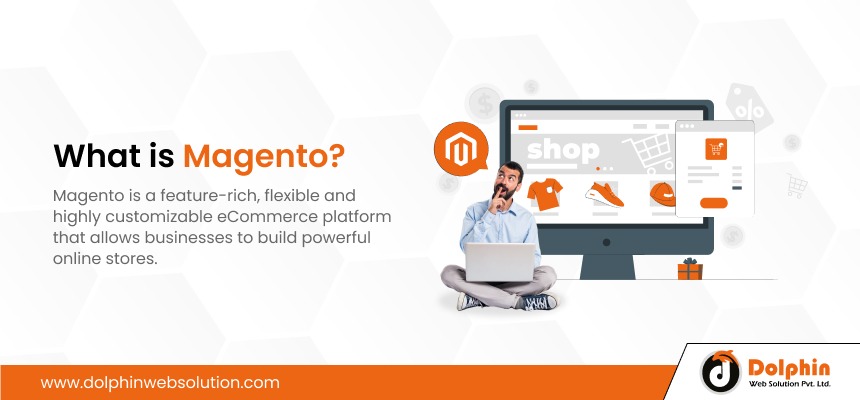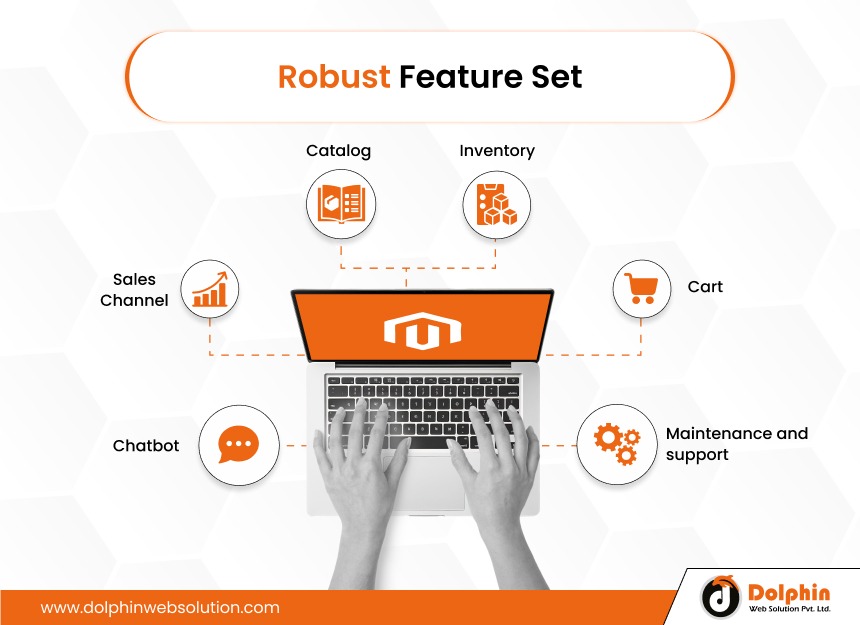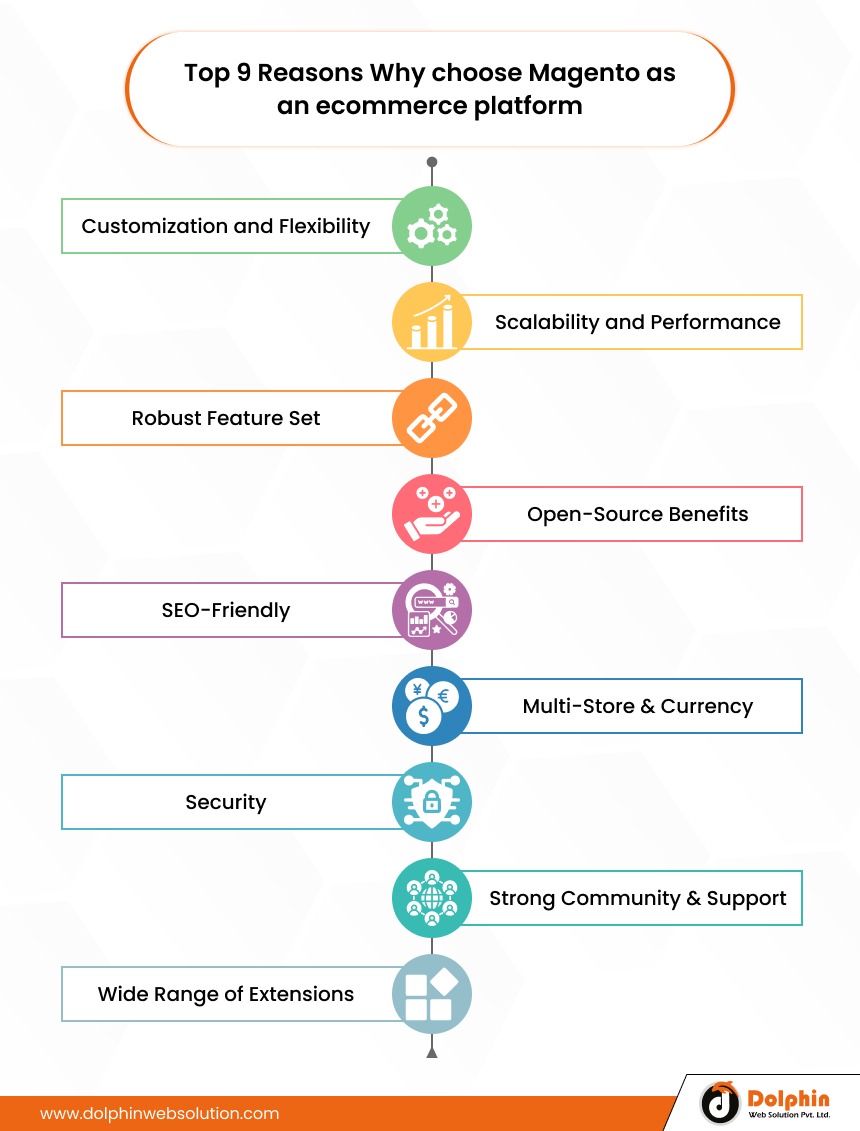Top 9 Reasons to Choose Magento as Your eCommerce Platform

Table of Contents
Summary :
This article discusses the key reasons to opt for Magento as your eCommerce platform. It provides insights into Magento features, its market share, flexibility, performance, security and more. It aims to help businesses understand why Magento is one of the best platforms for online store development.
Magento is one of the leading open-source eCommerce platforms powering over 250,000 online stores globally. With a massive 28% market share, it is second only to Shopify in the eCommerce platform space. Some key facts about the Magento platform include:
- Over 250,000 online stores use Magento for their frontend and backend operations. This number grows by over 10,000 stores each year.
- It has a massive developer community of over 50,000 developers globally who offer Magento development and support services.
- Being open source, it offers flexibility, customizability and affordable Magento website development costs to businesses of all sizes.
These aspects show how Magento has become the top choice for many. But, there is a lot more to it. Let’s find out.
What is Magento?

Magento is a feature-rich, flexible and highly customizable eCommerce platform that allows businesses to build powerful online stores. Developed using PHP and JavaScript, Magento follows a model-view-controller architectural pattern that separates website data and logic from presentation. This makes Magento development highly scalable and the front-end customizable without affecting the back-end operations.
At its core, Magento offers all the essential eCommerce features for online shopping including Catalog management, shopping cart, checkout, payment processing, customer accounts, customer support, reports and more. It also includes advanced capabilities like B2B selling, gift cards, rewards points, discounts, taxes, shipping, multi-store etc. that help create robust online stores.
The burgeoning Magento developer community offers solutions and extensions to enhance out-of-the-box features and integrate additional capabilities like marketplace, delivery management, subscribe and save, order management and more. Businesses can leverage this ecosystem and hire Magento developers at an affordable cost to build customized solutions within the estimated Magento website development cost.
Top 9 Reasons Why choose Magento as an ecommerce platform?
There are many compelling reasons for businesses to opt for Magento as their preferred eCommerce platform. Its flexibility, performance, rich features and strong ecosystem make it stand out. Some of the top reasons are discussed below:
1. Customization and Flexibility
Magento has an extremely modular architecture which allows deep customization without modifying core files. This flexible architecture is both a big advantage and the reason for its somewhat high Magento developer cost compared to other platforms. However, the trade-off is worth it since it provides immense power to tailor the platform over the long run.
Developers can customize designs, add new features, connect to other systems, modify existing workflows and more using plugins, themes and extensions. Common customizations include customizing the theme and design, building new page types, adding customized fields to products or customers, creating custom attributes, developing new payment gateways, inventory management systems and so on. This flexibility ensures the store evolves with the business at a reasonable Magento developer cost even years down the line without platform limitations.
2. Scalability and Performance
Being architected using a highly optimized MVC pattern, Magento can scale efficiently to handle increasing traffic and sales volumes. Key to this is its layered architecture that separates application logic from presentation. This clean separation means the application and database layers can be scaled independently.
Features like caching, lazy loading, minification and page speed optimization tools help developers increase Magento website page speed and deliver seamless experiences even during peak loads. Full page, block and database caching mechanisms ensure dynamic pages load instantly from the cache.
Also Read:
What is Magento PWA And It’s Benefits3. Robust Feature Set

Right out of the box, Magento offers a comprehensive set of eCommerce features to set up robust online stores without any custom development work like Catalog, cart, checkout, inventory, sales channels etc. It even powers complex B2B sales with features like custom pricing, purchasing processes, approval workflows, and more.
Add-ons further enrich it with advanced capabilities like marketplaces, omnichannel, order management, inventory sync, subscription ordering, CRM, BI & analytics, POS, and more. Popular extensions add functionalities like rewards programs, AI/ML personalization, order automation, financing, marketplace, mobile apps and others. This feature-rich platform minimizes the need for extra development within reasonable Magento developer costs.
4. Open-Source Benefits
Being open source, Magento is highly affordable for companies since there are no platform license fees. Just the initial estimated Magento website development cost needs to be accounted for. This makes it a very capital-efficient choice for businesses compared to proprietary platforms.
Its large community also ensures issues are quickly addressed at no extra Magento developer cost. Regular core security updates, bug patches and feature enhancements are contributed by the community and partners for free. This continuous improvement by thousands of developers elevates the platform’s capabilities at no recurring license costs.
5. SEO-Friendly
- XML Sitemap generation: Automatically creates sitemaps for products, categories and CMS pages for submission to search engines.
- Image optimization: Automatically resizes large images on the fly for faster page loads without degrading image quality.
- URL formats: Allows search engine-friendly URLs with category paths and product attribute values like color rather than numeric IDs.
- Metadata management: Developers can define custom meta titles, descriptions and open graph fields at category and product levels.
- Internal linking: Well-integrated navigation and cross-sells/up-sells ensure pages are deeply linked instead of isolated silos negatively affecting SEO.
6. Multi-Store & Currency
Magento excels at managing multiple stores, brands and websites under a single unified administration. Its multi-store functionality allows independent store views with distinct designs, languages, currencies and more despite sharing a single Catalog and customer base.
This multi-store capability future-proofs expansion into new sales channels, regions and B2B territories internationalization. Developers can create unique storefronts targeting specific geographies while being powered by the same core application at no extra development or operational costs.
7. Security
Being open source, security is a top priority for Magento to protect customer and business sensitive data from cyber threats. Its development framework considers security best practices from the ground up to deliver safe and trustworthy online experiences.
Key security hardening includes features like IP address blocking, brute force login protection, CAPTCHA on sensitive forms, system file permissions, encryption of sensitive data in transit and at rest, two-factor authentication for admin access, automatic security updates and more.
SSL/TLS is natively configured for all pages and checkout. Vulnerability scans and tests are regularly conducted by Magento and the community. Regular security patches like the one for Drupalgeddon2 zero-day are promptly released for free to keep stores updated against emerging threats within development budgets.
8. Strong Community & Support
With over 50,000 developers globally, Magento has one of the largest eCommerce communities offering rich support resources. Users get guidance from:
- With over 50,000 developers globally, Magento has one of the largest eCommerce communities offering rich support resources. Users get guidance from:
- Stack Overflow: Additional discussion channels for developers with 95k+ Magento Q&A.
- Wiki/tutorials: Comprehensive documentation and guides for all versions.
- Certified partners: Consultancies and agencies provide commercial support packages.
- Twitter/blogs: News, announcements, best practices from all corners.
- Chat groups: Regional user groups for local in-person support.
- Conferences: Annual worldwide event for networking and learning.
This extensive ecosystem ensures even obscure issues get timely resolutions at nominal additional Magento developer costs if needed. User enhancements are frequently reported upstream as well to give back to the community.
9. Wide Range of Extensions
Being the second largest eCommerce platform, the Magento marketplace hosts over 40,000 community-built extensions. These third-party plug-ins cater to unique business needs in critical areas like inventory, CRM, analytics, dropshipping etc. Businesses gain incremental value and differentiated solutions within estimated costs.
Final Thoughts
So, Magento is undoubtedly one of the most robust, feature-rich and scalable platforms for eCommerce businesses of all sizes. Its flexibility, security, performance, ecosystem and rich set of out-of-the-box tools make it able to support complex store requirements within reasonable Magento developer cost estimates. The multiple advantages outlined clearly show why Magento is a safe long-term investment and standard choice for online stores. With its huge partner network, development expertise is also easily available anywhere. Overall, the top 9 reasons make a compelling case for companies to choose Magento and hire Magento developers for developing future-ready online stores.

Hello!
Click one of our contacts below to chat on WhatsApp



